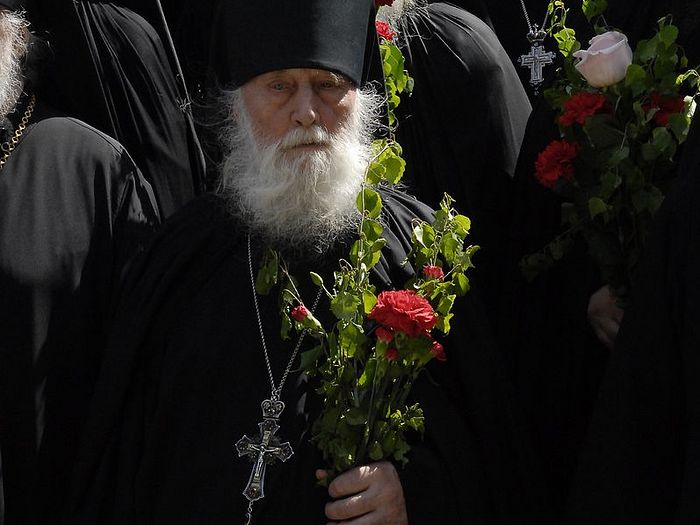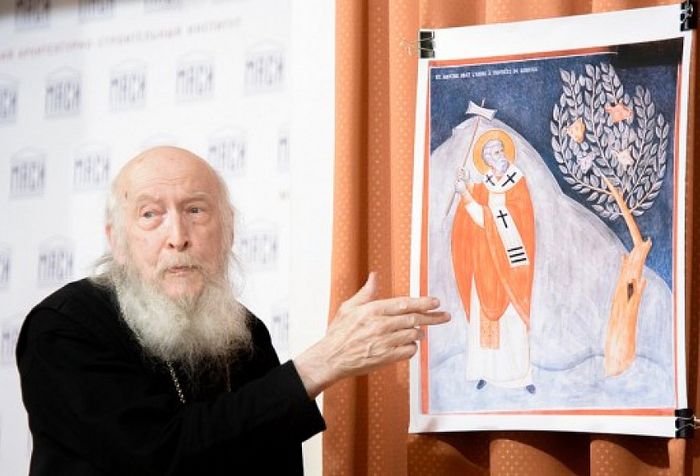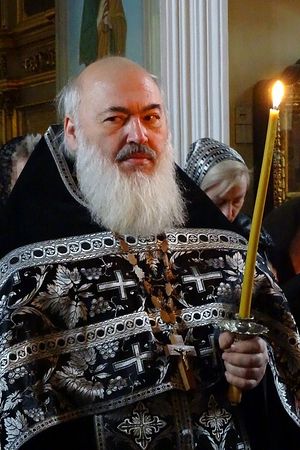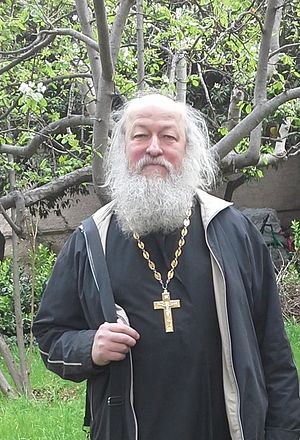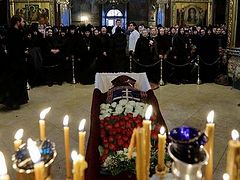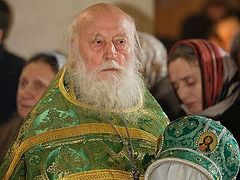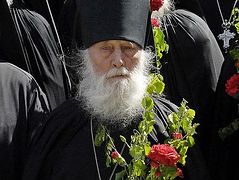On October 13, 2017, the oldest monk of the Trinity-St. Sergius Lavra, the elder and spiritual father known and beloved throughout Russia Archimandrite Naum (Baiborodin) reposed in the Lord in his 90th year of life. His spiritual children and fellow servants here speak about what kind of a person he was, and how he impacted their lives.
Receive from Fr. Naum the fire of the spirit
Hieroschemamonk Valentin (Gurevich), a monk of Moscow’s Donskoy Monastery:
To breach the hour of departure to the Lord, fear not these words of one of the pillars of twentieth century eldership, Fr. Naum (Baiborodin).
Pravoslavie.ru just published his burning word, marked by a touch of as if childlike simplicity and naivety, burning with the pain of the last days of mankind, and of Russia, so dear to his heart.
The number of his spiritual children, spread throughout the whole post-Soviet space on both sides of the Urals, including laity, monastics, abbots and abbesses of holy monasteries, is incalculable.
Early in the morning on the day of his repose, even before the official announcements in the media about the sad news, all the hotels of Sergiev Posad were already filled to capacity.
The miraculous gifts of insight and healing were characteristic of the deceased.
His gifts and burning spirit met with a fervent desire for Truth, which was characteristic of the young generations born in the years after the death of Stalin—“a tribe young and unfamiliar” to the veterans of the Communist Party in the Soviet Union…
Fr. Naum quickly engaged youth in Church life. He had such a gift to turn even the very furthest from the Church into people of faith.
One time, he was sending one after another communicating with him to the Lenin Library; they had to find a specific book there by his blessing; when people would begin to read it, they would realize that it expounded how to make a Russian stove in great detail. Fr. Naum blessed those who could to return to the land. In our area, the main thing in the village is to not freeze. In cities, the people don’t even think about where the heat comes from in their homes in winter, but in the villages you have to take care of your fireplace.
I also remember that Fr. Naum would bless his children to work in preparing spiritual literature; we would copy it on the Xerox, wherever we could. And I worked on this with his blessing. Even before the decades of the Church’s upsurge, Fr. Naum would say that many monasteries would open soon, and he tried to provide the future monasteries with soul-profiting reading by the efforts of his flock.
There are many known cases of healing by his prayers. He would even send those who needed healing of soul, as happens when someone leads an impious life, to some clinic to work, that people would be near to them. These illustrative examples had great influence.
In communication, he would find out who had what specialty, to understand how each person could be useful for the monastery, for the Church. He blessed young enthusiasts to learn from the Sisters of Mercy, those having a pedagogical education to teach children and adults the Law of God, and the young to learn solfeggio and vocals and to become choir members and deacons. He himself was burning and ignited the young by his burning “elder’s” spirit.
The clocksmith of Church life
Archpriest Segei Tkachenko, rector of the Church of the Nativity of the Most Holy Theotokos in Vladykino:
I returned from the army in 1977, and I needed to figure out how to live then. Thus, I went to see Fr. Naum. He was an igumen then. Not so many people were going to see him then, although it was already clear then that he was an amazing person. He was a scientist-turned-monk, a clairvoyant. When he had only just met me, he immediately gave me a Gospel. I left him with this Gospel in hand, and there on the bench near the entrance there was some nun sitting who said, “You will be a seminarian; you will become a priest.”
“Why?” I asked.
“Batushka only gives a Gospel to those who will be ordained.”
“I’m not planning to become a priest,” I said, shrugging my shoulders, and I moved on…
My path in life was already open to Fr. Naum’s gaze.
He also made an appointment with me when he had given me the Gospel. I went. He spoke with me, giving me a lot of valuable advice regarding my inner life. It came in handy later when I was a pastor. Then he asked, “What do you want to be?”
“I have a technical mind,” I answered.
“Alright, go to seminary!”
“I can’t!”
“Then enroll in a medical department.”
“I have no doctors in my family.”
“Enroll. I will help.”
I later found out that he knew many doctors. Then he asked me, “And where are you planning to go?”
“To MEI,” I said. “It’s an energy institute.”
“Enroll,” he said, blessing me. “I will pray.”
I enrolled. Then I came back to him, and he told me about the remaining days of summer before the beginning of my studies, “Go to Pukhtitsa. You will speak with Fr. Tavrion (Batozsk) in the Riga Hermitage there.”
After the army, I didn’t have any money to travel so far. He gave me thirty rubles, and with that, two friends and I went there. I breathed in a great deal of the confessing spirit there, speaking with those who hadn’t abandoned the Church under the Soviet authorities, but endured persecution, exile, and the camps.
Arriving at Riga Hermitage, we realized that they needed manpower there: There was a lot of hard labor. We stayed there to work. Fr. Tavrion instructed us the whole time. Later, when it was time to return to Moscow, he suddenly brought us, like Fr. Naum, thirty rubles. They were so alike in behavior. I took the money to Fr. Naum to pay him back, but he wouldn’t take it. This trip became for me then a significant milestone on my inner journey.
Later, when I was already studying in the institute, I constantly went to see Fr. Naum, to be spiritually fed by him, and afterwards too, when I was working in the Academy of Sciences. I took many of my co-workers to see Batushka, and they began their Church lives.
What was so remarkable about Fr. Naum? He filled your life with meaning and gave you direction.
There were two pillars in the Trinity-St. Sergius Lavra: Fr. Kirill and Fr. Naum. Fr. Kirill was a pastor of love. You would tell him that you’re studying in the institute, and it’s very hard to say the full morning and evening prayers, and you have to get up so early, you’re constantly doing homework at night… “Well, then abbreviate your rule,” Fr. Kirill would say. You would go to Fr. Naum with the same thing, and he would immediately say, “So learn them by heart.” Fr. Naum was very demanding.
I went to see him one time, and he said, “Come on, get ready. There was a fire, and we have to go help.”
He was going somewhere pretty far away in the Moscow suburbs. I started to resist: “Batushka, I have homework to do…”
The next day, he already didn’t notice me. If you’re not mature, you’re not mature; you still have something to learn. Your inner life is open to elders, whether you are ready to obey the will of God or whether you are not—holding onto your own will.
He taught us to pray, not asking anything for ourselves: neither money, nor position, nor prosperity—just pray, and that’s it. He taught us the Jesus Prayer. But who were we? Young, simple guys—we weren’t hermits that such a gift should be shared with us.
Fr. Naum was a great Russian patriot. He greatly loved and somehow internally experienced its history. He often spoke about the Battle of Kulikovo. We just celebrated the feast of the Protection—he somehow felt the protection of the Mother of God for Russia. He could mentally turn to the times of Sts. Anthony and Theodosius, whom the Mother of God blessed to found the Kiev Caves Lavra and sent builders to erect the first church. Batushka wholeheartedly loved the Mother of God. He deeply revered St. Sergius. He felt their intercessions for the Russian people.
Throughout all of Russia, in every monastery and church, wherever you might go, you will meet children of Fr. Naum serving there. How many abbots and abbesses of monasteries he nourished!
I often went to see Fr. Naum. Later, when I was already a priest and the rector of a large parish I sometimes had such pressing work that I couldn’t get away. Moreover, I remember going to Fr. Naum, and he had heaps of people sitting in the den waiting for him. Fr. Benedict, the current deputy abbot of Optina Pustyn, was there once, waiting to be received. I hadn’t been in a few years, but I went to see him a year ago. He was already very weak. I brought a spiritual child with me. He laid his hand on my head and asked, “Why haven’t you come to see me for four years?”
Of course, he had clairvoyance.
I know of one time when a woman came to see him, and brought another woman with her, and started asking him, “Batushka, she’s very unhappy. Nothing works out for her, she’s sick, and penniless.”
Batushka looked at the woman she brought, and said, “Why did you bring such a rich woman?”
“What rich woman?! I even bought her train ticket to get here…”
And then it turned out that this woman was very wealthy—she just hid her income and savings; but the elder saw everything, like an x-ray.
With his inner gaze, Fr. Naum encompassed the entire mechanism of spiritual, Church life: where something was broken, where something needed to be greased, where someone needed replacing. He would send people to where there was some kind of malfunction. Standing on the place of this broken gear, which you are replacing, you couldn’t bear it—you yourself would bread—but you would be saved if you obeyed the elder and stood on this structure. Fr. Naum was a strong, resolute man, a kind of military commander of the spiritual fronts. He would send his children where they had to show their maximum strength: Whoever you would be there—abbot, abbess, or just a monastic—you were necessary.
It is somewhat lost now in our Church life, but for us all, Fr. Naum was a true spiritual father. When Fr. Naum had become weak, he blessed all of us to choose a spiritual father who was younger, to be able to constantly confess, and to go to to solve pivotal issues.
Two such great elders died one after the other: Fr. Kirill and Fr. Naum.
We would turn to both of them. Fr. Naum once simply said about this, “You won’t find everything immediately, and you won’t receive everything from any one person. Pick a cherry wherever you see it.”
That is, where you feel grace-filled help, the engagement of God—the Lord Himself is active through this or that spiritual father. He had a deep experience of the Church as the one Body of Christ. He is with us today by his prayers.
“Have you been to see the venerable father?”
Archpriest Vyacheslav Kulikov, a cleric of the Church of St. Nicholas the Wonderworker in Zayaitskom:
I met Fr. Naum at the very beginning of my life in the Church. I remember finding myself at Holy Trinity-St. Sergius Lavra in 1983, and they asked me there, “Have you been to see the venerable father?”
“No.”
“Go.”
“And what will he say to me?” I asked, thinking they were talking about St. Sergius.
“He’ll say something,” they tell me, having in mind, it turns out, Fr. Naum.
He spoke with me. He advised some spiritual literature for me to read. He blessed me at that time to continue studying science. I told him about my work. Later I even went to see him with my academic advisor. He himself was a scientist, and people from the academic world often turned to him. I know he sent many to monasteries, some becoming, with his blessing, abbots and abbesses.
“People like Fr. Naum showed in our times the path of genuine asceticism”
Alexei Ivanovich Sidirov, doctor of Church history, professor of the Moscow Theological Academy and the Sretensky Theological Seminary:
The Lord has shown me great grace: He sent me the amazing elder of the Russian land—our batushka Fr. Naum. I met him in 1980, being then still a wholly Soviet person—that is, a comparatively young scientist, ambitious, quite arrogant, and flaunting my erudition. Interestingly, he didn’t receive me for a long time: He would just walk by and cast a glance at me in passing. Probably, my natural stubbornness forced me to go to his crude reception room in a cellar again and again.
However, during this time, I had already made my first steps into Church life: I went to Pechory, and Fr. John (Krestiankin) and Fr. Adrian (Kirsanov) blessed my wife and I to get married. The current deputy abbot of Optina Monastery Fr. Benedict (Penkov) also did a lot for us. He had “scared me off” from my fervent studies in Gnosticism and Manichaeism (my doctoral dissertation was already largely ready), turning my attention to the works of St. Maximus the Confessor. At first, of course, I resisted (it was almost like starting life over again, it seemed to me), but then, turning to translations of the words of the venerable father, I realized what great treasures they concealed.
When Fr. Naum finally began to speak with me, at first I didn’t even notice how my life began to dramatically change. The process of becoming a Church person was, for me, rather painful: Every step required “blood of soul.” One memory, about how I quit smoking, still leaves me in awe: how Batushka struggled with me, and how much he prayed so I would sever myself from this, as I then thought, “innocent” sin! How many labors it cost him to convey to me what is the true spiritual life! I remember how he taught me to pray: He would lean his head into me and quietly whisper, “Lord Jesus Christ, Son of God, have mercy on me, a sinner.”
In general, the whole Church life of our family has passed under his leadership. He blessed our children and helped determine their paths in life. Our daughter got married to a future priest. Our grandchildren were born by the prayers of Fr. Naum, and when our grandson was hopelessly sick at three years old (doctors had given him one or two years to live), and then went blind, it was Batushka who implored for him. By his prayers he was delivered, to the surprise of the doctors, not only from his incurable disease, but also from blindness (he now has 20/20 vision).
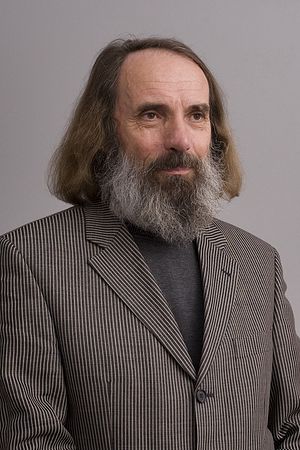 Alexei Ivanovich Sidirov
Alexei Ivanovich Sidirov When the elder was sick lately, we were orphaned, left without his care. He even appeared to me in a dream: “Well, you’re already on your own…”
“How are we on our own?” I thought.
But I am sure that Batushka will not leave us—he is with us in spirit. The last time I confessed to Batushka, he already couldn’t respond, even just to let me know if he heard me or not, although I was sure that heard and understood me. I saw what a serious condition he was in, all covered in tubes, and I clearly realized that our beloved batushka was suffering for us, his children—a great number throughout all of Russia, in monasteries and among the laity. He, like the apostle Paul, was all things for all men (1 Cor. 9:22).
The enemy was taking revenge on him for turning people to faith, giving himself entirely: There were so many attacks on him, and insinuations of all sorts. But I was deeply and firmly convinced that Batushka was a bearer of the spiritual Tradition, stemming from the first centuries of Christianity through Sts. Anthony the Great, Maximus the Confessor, and others, and also our great Russian elders. Speaking for myself, he was one of the greatest elders of the Russian land. People such as Fr. Naum, Fr. John (Krestiankin), and the recently-reposed Fr. Kirill (Pavlov), showed our times the path of genuine asceticism. For these whole thirty-six years, I probably haven’t been so sorrowful over anyone, even my biological father, as now, having learned of the passing of our beloved Batushka Naum.
May God grant the Heavenly Kingdom to our dear Fr. Naum!

